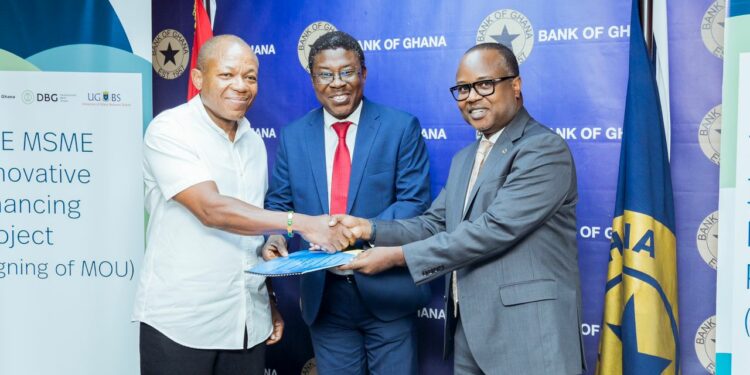BoG, DBG partner to tackle MSME financing challenges in Ghana
The Bank of Ghana, in collaboration with the Development Bank Ghana (DBG) and the University of Ghana Business School (UGBS), has embarked on an ambitious initiative aimed at revolutionizing access to finance for Micro, Small, and Medium Enterprises (MSMEs) in the country.
At the core of this initiative lies the signing of a Memorandum of Understanding (MoU) between the Bank of Ghana and Development Bank Ghana.
Addressing attendees at the MoU signing ceremony as well as the launch and commissioning of the study on “Innovative Financing for Micro, Small, and Medium Enterprises (MSMEs) in Ghana”, Dr. Maxwell Opoku-Afari, the First Deputy Governor of the Bank of Ghana, highlighted the critical role of credit expansion in driving economic prosperity, particularly in emerging markets such as Ghana.
He emphasized the imperative of bridging the financing gap that has long hindered the growth trajectory of MSMEs, citing risk aversion among banks and a turbulent economic landscape as primary obstacles.
Against the backdrop of global uncertainties, from the disruptive impacts of the COVID-19 pandemic to geopolitical tensions, the country, he noted, has proactively sought to address these challenges through policy and regulatory reforms. Hence, the establishment of the regulatory framework for development finance institutions, epitomized by the licensing of DBG, represents a significant milestone in this endeavor.
“As a central bank, though price stability remains our primary mandate under the inflation targeting framework, economic growth through credit expansion is also of key concern to us, and that is why a major consideration is given to the impact of our policies on the real sector. For instance, much of the reforms that have been initiated within the banking sector in particular, have been geared towards creating sound, stable, well-capitalised and profitable institutions capable of supporting the real sector and economic growth through increased lending,” he remarked.
“Historically, banks have been conservative in their lending to MSMEs due to the perceived high risks associated with lending to them. This risk aversion of banks has been exacerbated by the global and domestic shocks that the economy has had to grapple with in the past four years, starting with COVID-19, to the geopolitical tensions between Russia and Ukraine, and the macroeconomic challenges, all of which culminated in the Domestic
Debt Exchange Programme (DDEP) in 2022-2023. All these developments have necessitated the introduction of policy and regulatory reforms to encourage lending to critical sectors of this economy, such as MSMEs.” he added.
However, despite these commendable efforts, the funding gap persists, posing a formidable barrier to the sustainable growth of MSMEs. Recognizing the urgency of the situation, the commissioning of the study on “Innovative Financing for MSMEs in Ghana” therefore heralds a new chapter in Ghana’s quest for inclusive economic development.
The study, undertaken by the University of Ghana Business School (UGBS), seeks to unravel the complexities of MSME financing, shedding light on the challenges faced and proposing innovative solutions to bridge the divide.
By providing empirical insights and evidence-based recommendations, the study promises to inform policy formulation and catalyze transformative change in the financial landscape.
In conclusion, Ghana’s commitment to fostering an enabling environment for MSMEs is resolute. Through strategic partnerships, regulatory reforms, and pioneering research initiatives, the nation is poised to unleash the full potential of its entrepreneurial ecosystem, driving job creation, economic diversification, and sustainable development.









